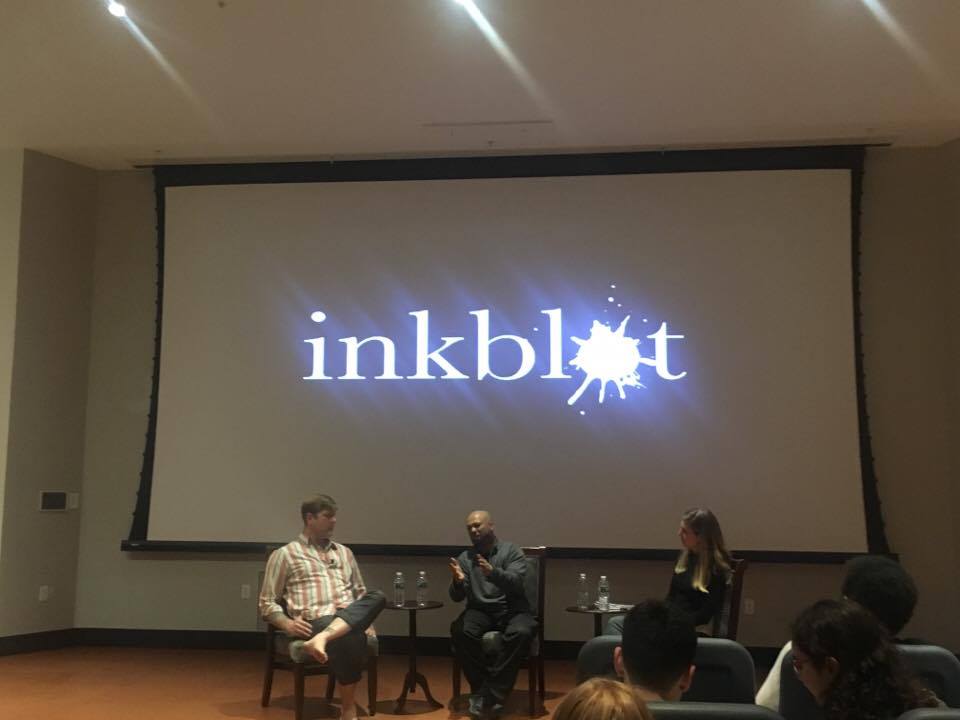
The Inkblot Project, Who becomes a terrorist and why?
Radical Islamism is ‘terrorism in an Islamic costume,’ said former recruiter for a Salafi jihadi group
The Inkblot Project developed by the Pardee School of Global Studies hosted the event, “Who becomes a terrorist and why?” to enlighten students on radicalization last Friday at the Law Auditorium.
Inkblot hopes to offer “human solutions for human problems” and to debunk the common psyche’s association of radicalization with ideology.
Parents for Peace, an organization which aims to provide help for young people going through identity crises, partnered with Inkblot. The organizations aim to find healthy solutions to “the puzzle of forming an identity that we all go through,” said Myriam Nadri, the Parents for Peace representative at the event.
“Parents for Peace does not make excuses for violence but offers a narrative to explain our complex world,” she added.

Opposite ideologies, one crisis
The two speakers, Arno Michaelis, former white supremacist skinhead, and Muvin Shaikh, former recruiter in a Salafi jihadi group, were the symbols of this vision on radicalization. Michaelis described how he grew up in a family where he became desensitized to violence and started to reproduce the circle of violence outside the household.
“Nothing makes people angrier than the swastika; that’s why I was attracted,” said Michaelis.
In his teen years, going through an identity crisis, he thought to have found refuge in the white skinhead movement. The group dynamic and the sense of community were reassuring to him.
“You assume your identity based on the ideology of your group,” said Michaelis. “My identity was not my name, my town, but white supremacist music and the ‘warrior’ ideology that presupposes that the entire world is a threat to who you are.”
Michaelis then built his own white supremacist group that expanded over the years to end up in being the Northern Hammerskin group. This group later joined the Hammerskin Nation, one of the largest skinhead organizations in the world.
“I radiated violence and thought the world was a system,” said Michaelis.
 Shaikh is a Canadian Muslim of Indian heritage who spoke about his story of self-radicalization. After having been reprimanded by his family for throwing a party while his parents were out of town, Shaikh decided he wanted to become more religious and turn to the religion that he was raised in.
Shaikh is a Canadian Muslim of Indian heritage who spoke about his story of self-radicalization. After having been reprimanded by his family for throwing a party while his parents were out of town, Shaikh decided he wanted to become more religious and turn to the religion that he was raised in.
He traveled to India and Pakistan to study Islam in the 1990s. While in Pakistan, he met people affiliated with the Taliban.
“I was facing uncertainties and needed certainties,” said Shaikh. “I wanted change now.”
Inkblot cites Shaikh describing his old self with these words: “A kid with an identity crisis, who feels shame and guilt and has some military background, shows up in a remote area in Pakistan, close to Afghanistan, and suddenly meets these people who were, to me, the embodiment of everything that I was seeking: militant, religious, and accepted by the people.”
Shaikh described himself at the event as a lawful extremist as he was a recruiter for a Salafi jihadi group. Although he embraced the radical Islamist ideology, he never committed acts of violence on its behalf. He also stressed that radical Islamism is “terrorism in an Islamic costume.”
Although the ideology is predominant factor, the group dynamic plays an important role: there is indeed a single template of people’s reasons for joining such group: “while the ideology is arbitrary, the notion of being persecuted by an enemy that wipes us out off the face of the earth is present,” said Michaelis. “Both groups have this lost glory. They feel the need to go back at a time where they were great,” added Shaik.
“The presence of suffering is a common thread that is a prerequisite for anyone to get involved in violent extremism.”
De-radicalization
Both Michaelis and Shaikh realized their ideologies were wrong.
Michaelis had lost many friends in this circle of violence and became a father at 24.
“At some point, I came to realize how I was full of sh*t,” said Michaelis.
9/11 was what brought Shaikh to the beginning of de-radicalization. He started to reflect on the implications of his ideology and went back to the Middle East, this time to Syria, to study Sufi Islam. His verse-by-verse study of the Quran challenged his point of view again, on top of the fact that Syria was discriminatory towards Indians, which truly opened his eyes. Going back to Canada, he became an undercover operative in Canadian-affiliated ISIS groups for the Canadian Security Intelligence Service.

Radicalization as a human journey
“He wore the swastika, I wore the big robe and beard and was the ‘in-your-face Muslim,” said Shaikh about Michaelis and himself.
“Radicalization is a human journey; it mostly strikes those who have little to lose,” he added. “The control should not come from the government but from ourselves, by being watchdogs for our neighbors. Because it could happen to anyone.”
